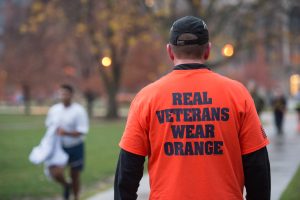The School of Education (SOE), the Institute for Veterans and Military Families (IVMF), along with the Office for Veterans and Military Affairs (OVMA) has received financial support through the Collaboration for Unprecedented Success and Excellence (CUSE) Grant Program at Syracuse University. The project, entitled “VET-SIM: Full Design & Implementation” will receive $29,943 over two years.
 VET-SIM, a developing interdisciplinary initiative within the School of Education, involves a series of simulations designed to support veterans as they transition from military service to collegiate study. Nine student veterans participated in the pilot project that began in spring 2017. The VET-SIM pilot model included two learning experiences: three one-to-one simulations and three group debriefings. The core of VET-SIM is to give student veterans an opportunity to talk openly about their nontraditional experiences, and unique challenges as they enter collegiate study. The CUSE funding will support the design and development of additional simulations.
VET-SIM, a developing interdisciplinary initiative within the School of Education, involves a series of simulations designed to support veterans as they transition from military service to collegiate study. Nine student veterans participated in the pilot project that began in spring 2017. The VET-SIM pilot model included two learning experiences: three one-to-one simulations and three group debriefings. The core of VET-SIM is to give student veterans an opportunity to talk openly about their nontraditional experiences, and unique challenges as they enter collegiate study. The CUSE funding will support the design and development of additional simulations.
In a simulation, student veterans are paired with trained actors for a one-to-one exchange in a technology-equipped simulation room. The conversations, driven by the actors, are around a specific situation or context related to veterans transitioning into collegiate study. These one-to-one sessions are videotaped and each student veteran reviews the exchange. The second part of the VET-SIM involves a debriefing a week after the simulation, where student veterans are asked to come together to discuss their individual experiences in the simulation. Each veteran experienced the same simulation, but could have approached the situation in a variety of ways. The debriefing process intentionally makes space for the group to engage as a community, discuss their approaches to the simulated situation, and allows each student the option of sharing their videotaped simulation. For those who agree, the group then collectively examines the video and discusses approaches, practices, strengths, and struggles.
The VET-SIM pilot focused on specific themes from focus groups with student veterans at Syracuse University. The students talked about their experiences on campus, expressing several challenges, including confusion with navigating the higher education system, and feeling out of place because of their age and maturity. The students also stated frustration with faculty and traditional students generalizing about their health and well-being, as well as others asking too many questions about their military life. Consequently, one simulation situated a veteran in a one-to-one conversation with a teaching assistant (trained actor), who expressed assumptions about post-traumatic stress disorder. In another simulation, the veteran engaged with a faculty member who, upon learning of the veteran’s past military service, immediately asked the student veteran to engage in a leadership role. The third simulation situated the veteran with a college peer who asked too many probing questions about military life.
 The principal investigator on the VET-SIM grant is Benjamin Dotger, Professor and Chair of Teaching and Leadership at the School of Education. Dotger, who has been using simulations (SIMs) for thirteen years, finds them to be an effective way to prepare pre-service teachers and educational leaders for challenging content and/or delicate interpersonal interactions professionals may encounter in their field. This success prompted the partnership between SOE, IVMF and OVMA to develop a way to adapt the SIMs model to support student veterans as they transition from military service to collegiate study.
The principal investigator on the VET-SIM grant is Benjamin Dotger, Professor and Chair of Teaching and Leadership at the School of Education. Dotger, who has been using simulations (SIMs) for thirteen years, finds them to be an effective way to prepare pre-service teachers and educational leaders for challenging content and/or delicate interpersonal interactions professionals may encounter in their field. This success prompted the partnership between SOE, IVMF and OVMA to develop a way to adapt the SIMs model to support student veterans as they transition from military service to collegiate study.
The CUSE grant will allow the VET-SIM team to continue developing simulations for student veterans . The two year project cycle will also support the team in seeking additional external fiscal support for the project.
